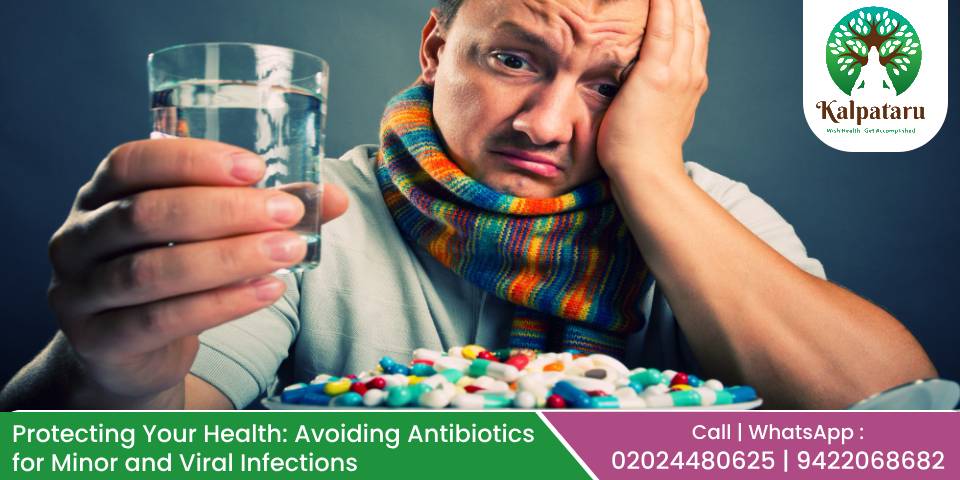In today’s fast-paced world, it’s easy to reach for antibiotics as a quick fix for common illnesses like colds, coughs, sore throats, and fevers. However, it’s important to understand that antibiotics are primarily effective against bacterial infections, and many of these everyday ailments are caused by viruses. Overuse of antibiotics not only contributes to antibiotic resistance but can also weaken your immune system. In this blog, we’ll explore the reasons to avoid antibiotics for minor and viral infections and provide alternative, natural remedies that can help you on your path to recovery.
Antibiotics for Viral Infections:
First and foremost, it’s essential to realise that antibiotics are not effective against viral infections. Conditions like the common cold, the flu, and most cases of sore throats are caused by viruses. Taking antibiotics for these illnesses is not only ineffective but can lead to unwanted side effects and contribute to the development of antibiotic-resistant superbugs.
Natural Remedies for Common Ailments:
- Coughs: Instead of relying on antibiotics, consider turning to nature’s remedies. High-quality honey is a soothing and effective treatment for a nagging cough. It can help relieve irritation and provide relief without the need for antibiotics.
- Sore Throats: Gargling with warm saltwater or sipping on warm water can help alleviate the discomfort of a sore throat. Honey, with its natural antibacterial properties, can also provide relief.
- Fevers: Fever is your body’s way of fighting infection, so it’s not always necessary to suppress it with medications like paracetamol. You should only consider fever-reducing medication if your fever exceeds 100 degrees Celsius or if it’s really being difficult for you to tolerate that temperature. Otherwise, rest, maintain warmth, consume warm soup, and eat a light diet to support your body’s natural defenses.
- Colds: The saying, “If you take medicine for a cold, it will be cured in 7 days. If you don’t take medicine for a cold, it will be cured on its own in 7 days,” holds some truth. Instead of relying on medications, natural remedies like applying a ginger-cardamom paste to your forehead and nose can provide relief from cold symptoms.
Read about: Ayurvedic treatment for psoriasis
For more information and treatment modalities watch our informative video
Here are some facts and statistics regarding antibiotic resistance in India:
- High Antibiotic Consumption: India is one of the world’s largest consumers of antibiotics. Approximately 40% of these antibiotics is used inappropriately, such as for viral infections or without proper prescription.
- Rising Antibiotic Resistance: The misuse and overuse of antibiotics in India have contributed to a significant increase in antibiotic resistance. Bacterial infections that were once easily treatable are becoming more challenging to manage.
- Hospital-Acquired Infections: Hospital-acquired infections, including those caused by antibiotic-resistant bacteria, are a major concern in India’s healthcare system. These infections can lead to prolonged hospital stays, increased healthcare costs, and higher mortality rates.
- Tuberculosis (TB) and Antibiotic Resistance: India has a high burden of drug-resistant tuberculosis (DR-TB), which is challenging to treat and control. The emergence of multi-drug-resistant (MDR) and extensively drug-resistant (XDR) TB strains is a significant public health threat.
- Impact on Child Health: Antibiotic resistance can be particularly harmful to children. In India, where childhood illnesses are prevalent, antibiotic resistance can complicate the treatment of common infections, such as pneumonia and urinary tract infections.
- Limited New Antibiotics: The development of new antibiotics has slowed down, and there are limited treatment options for some drug-resistant infections. This makes it crucial to preserve the effectiveness of existing antibiotics.
- Economic Burden: Antibiotic resistance imposes a substantial economic burden on healthcare systems, as it leads to longer hospital stays, increased healthcare costs, and a greater need for advanced treatments.
- Government Initiatives: The Indian government has initiated efforts to address antibiotic resistance, including the National Action Plan on Antimicrobial Resistance (NAP-AMR) to promote responsible antibiotic use and surveillance of resistance.
By understanding the limitations of antibiotics and the consequences of their misuse, individuals can take steps to protect their health and contribute to addressing the critical issue of antibiotic resistance, particularly in India.
Dr. Manoj Deshpande and Dr. Aparna Deshpande at Kalpataru Ayurvediya Chikitsalaya™ Clinic provide the best Ayurvedic Treatment for various diseases in Pune, Maharashtra. For more information about our comprehensive treatment options, or to request an appointment with the best Ayurvedic Doctor in Pune, call +91 9422068682 / +919764837167 / 020-24480625 or Click on Book an Appointment.

